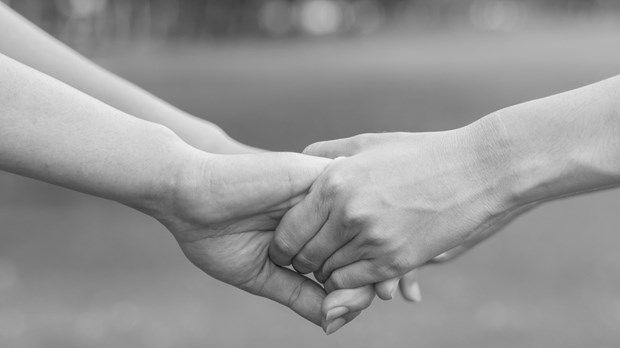Her Secret Heartache

After an intense discussion about grace during our women's Bible study, my friend Susan seemed disturbed when she left. I called her later that afternoon.
"How are you?" I asked.
"Oh, Gayle," she sobbed. "I have something to tell you, but I can't yet. You don't know everything about my past. I have to tell my daughter first before I can talk to you about it. I hope you'll still love me after I tell you."
After we hung up, Susan's words played over in my mind. What could be so bad she'd think I wouldn't love her anymore?
Two weeks later, Susan was ready to share her story. When she was only 15, she became pregnant. Her mother, a single mom, and Susan's boyfriend saw abortion as the only solution. They agreed to split the expense for the procedure; then Susan's boyfriend drove her to the clinic. Susan aborted another baby at 17. As Susan told me her story, I felt overwhelmed by emotions of grief for Susan and the burden she'd carried for years, sorrow for her two aborted babies, and shock. I'd never considered one of my closest friends could have had an abortion.
I later learned Susan is one of an estimated 43 percent of women who have had an abortion by age 45; almost half that group has aborted more than one baby. Abortion knows no boundaries; age, race, socioeconomic status, even religion makes little or no difference in whether or not a woman's had an abortion. It's likely someone you know is post-abortive. She could be the woman who sits beside you at Bible study, your child's Sunday school teacher, or your best friend.
So what do you do when a friend reveals this deep secret?
Accept
AND LOVE YOUR FRIEND.
One of the best things you can do is to love your friend for who she is now and not reject her for what she did in her past. Susan shared with me in sorrow. Some women may be matter-of-fact about their abortion, while others still see it as a choice they don't regret. No matter what their attitude is, they need your love.
Susan shared her secret with great deliberation. She wasn't asking for my approval; she sought grace, unconditional love, and healing for the burden she'd carried over the years. Susan's guilt is typical of women who have had abortions. In a survey conducted by Open Arms Ministry, 80 percent of post-abortive women reported problems with guilt, while 70 percent reported depression. And 63 percent said they couldn't forgive themselves.
For the women living with this guilt and depression, talking to a friend can be the first step out of darkness into the light. But only if they find acceptance. Joyce, who had an abortion when she was 30, found living with the regret impossible. She turned to two Christian friends for help, but her friends stopped talking to her. After their rejection, Joyce shared her story with others, especially boyfriends, as a defense mechanism. She thought, If I tell you, then you'll reject me. Eventually, she told a male friend whose reaction surprised her. "He was so caring," Joyce says. "His acceptance helped me heal." Because of him, Joyce found the courage to seek help at a pregnancy care center.
Encourage
POST-ABORTION SUPPORT AND RECOVERY.
As soon as Susan told me about her past and asked for my support, I began searching for resources to help her. After talking to Sue Rosenberger, the leader of a post-abortion Bible study in California, I learned the importance of women in Susan's situation joining a support group and going to a post-abortive Bible study, such as one called Forgiven and Set Free by Linda Cochrane. "When you've had an abortion," Sue told me, "you feel as though you're the only one in the world that would choose to kill your child. It's even worse if you were a Christian. Hearing from other women who went through an abortion helps you no longer feel alone. A group also helps women to remember things in their abortion experience they may have buried deeply."
I called local churches and pregnancy care centers and finally found a center 30 miles away that offered Forgiven and Set Free. I also looked for websites and online articles to help both Susan and me.
Listen
WITH YOUR HEART.
After immediately accepting your friend and encouraging her to go through recovery, the next step is to listen with your heart. This doesn't mean trying to "fix" your friend's problems or offering spiritual platitudes. You're intentionally listening to your friend and watching what God does in her life through the recovery process. Yes, you'll hear pain, grief, even regret. But remember, you don't have to be her counselor—just her confidante, encourager, and prayer partner.
Tricia relates how her closest friends supported her after she wrote them letters revealing the abortion she'd had at 15: "Each shared her unconditional love. They listened but didn't probe. They supported me, prayed for me, and urged me to continue my post-abortive Bible study."
Notice
PAINFUL REMINDERS.
Recently I attended a Christian conference where a speaker shared her testimony of how she had been headed to an abortion clinic, only to decide not to follow through with the procedure. Then she passed around a photograph of her beautiful 13-year-old daughter. It was a touching story of God's grace. However, I was sitting beside Ann, who had an abortion when she was 16. I reached over and touched Ann's hand as she held the picture of the girl. She smiled at me with tears in her eyes. "Thank you for noticing," she whispered.
For post-abortive women, the anniversary date of their abortion, the mention of abortion in a sermon, Bible study, or casual conversation, even a beautiful testimony can trigger upsetting memories.
By being aware of situations that dredge up painful emotions, you can support and care for your friend. Beth, a friend of a post-abortive woman, says, "If something comes up that may trigger the thought or memory, it's my place to make sure I'm within arm's reach, or to check in with her one-on-one afterwards to say, 'Hi, how are you?' and see if she wants to take the conversation down that path."
Encourage
A BALANCED LIFE.
Post-abortion recovery can be a time-consuming process. In recovery, the layers of abortion are peeled back, revealing how the abortion has affected not only a woman's emotional, physical, and spiritual state, but also the choices she's made since. Some women need to go through a recovery study more than once to complete their healing.
You can bring a sense of balance into your friend's life by continuing aspects of your friendship as it was before she revealed the abortion. Go shopping, sightseeing, or to a chick flick. For long-distance friends, Tricia's friend Cindy says, "We talked every day on the phone. Sometimes we talked about her recovery, but often we talked about the novels we were reading, what our kids were doing, and our parenting frustrations!"
Bringing balance also includes encouraging your friend to use her passions and abilities for God. For Susan, healing was the first step toward helping other women who have had abortions. During her recovery, Susan was asked to pray for post-abortive women at a National Day of Prayer service. After the expected prayers for our country and leaders, Susan's topic touched a nerve. An audible catch of breath resonated and a deeper silence covered the crowd. Susan's voice grew stronger as she prayed, "Father, bring light to all of the women who are walking in darkness. May they find forgiveness and healing through you. Amen."
Susan walked back to join her husband and friends, trembling with emotion. Moments later, a woman approached Susan and asked to talk with her. I watched Susan talk with the woman, knowing that through Susan's obedience and courage, God was drawing another post-abortive woman into the light.
I was privileged to see the beginning of Susan's ministry that day. I also am privileged to walk with her on this healing journey and see God's transforming work up close and personal. Susan's abortions will always be a part of her—and of our relationship. But despite her fears, Susan's past hasn't caused me to lose my love for her; instead, it's only increased my love.
Gayle Gresham, a freelance writer, lives with her family in Colorado.
Copyright © 2005 by the author or Christianity Today/Today's Christian Woman magazine.
Click here for reprint information on Today's Christian Woman.
Read more articles that highlight writing by Christian women at ChristianityToday.com/Women
 Read These Next
Read These Next

 I Was RapedCould God heal my deep emotional scars?
I Was RapedCould God heal my deep emotional scars?
 The Real Meaning of ModestyHint: It's not about sexual temptation.
The Real Meaning of ModestyHint: It's not about sexual temptation.








 Homepage
Homepage